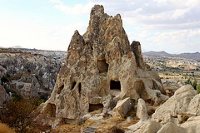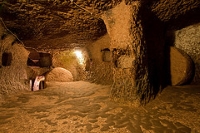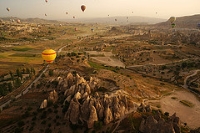Cappadocia Travel Guide
Cappadocia occupies the centre of Turkey, the region between the Black Sea in the north and the Taurus Mountains, and between the capital Ankara and the city of Malatya to the east. Famous for its spectacular natural rock formations and valleys, Goreme National Park, as it is known today, is strewn with underground cities, stone chapels, monasteries, and dwellings that were hewn out of the eroded volcanic rock as early as 400 BC.
Thousands of years of wind and rain erosion on a landscape of soft, volcanic stone, topped with hardened larva caps has created a fascinating landscape of rock cones and pinnacles that are known as 'fairy chimneys'. The Valley of Fairy Chimneys is the most popular area, and lies roughly within the triangle formed by the three main towns of the region, Avanos, Urgup, and the main transport hub of Nevsehir.
Outside the triangle to the south are the remarkable underground cities of Derinkuyu and Kaymakli, where layers of tunnels and an intricate system of caves hid generations of settlers and sheltered early Christians fleeing persecution. The Ilhara Canyon is another religious hideaway with more than 100 painted churches and about 4,000 dwellings carved into the rock walls or concealed within the cliffs; its river bed and lush vegetation stand in stark contrast to the dusty, seemingly barren land above.
Cave dwellings, ancient monasteries and painted chapels are well camouflaged, with entranceways that are barely noticeable among a landscape of perforated cliff walls and rock fissures. Houses of volcanic stone blend unobtrusively into the natural surroundings, pigmented in natural shades of ochre and yellow, to pinks, greys and greens, and many people still inhabit the cones and chimney formations. In tourist towns such as Goreme, delightful little hotels and pensions are built partially into the rock or are housed within a rock cone and offer cave-style rooms.
Things to do in Cappadocia
The towns of Cappadocia each have their own unique flavour and appeal, so visitors exploring the region will have plenty of activities and sightseeing opportunities to enjoy. The town of Goreme is certainly a must see attraction in Cappadocia, with its fairy Chimneys, wonderful hotels, restaurants, carpet merchants and beautiful antique shops. The friendly residents openly welcome tourists to their little town, so this would be a good place to start an adventure through the Cappadocia countryside.
Like Goreme, the many other enchanting villages in the region are carved out of the hillsides and each will hold their own little treasures: Byzantine rock-cut churches with dazzling frescoes and labyrinthine underground cities, where early Christians once hid from invaders. With so much history and truly unique landscape and architecture, Cappadocia really is a magical wonderland that both nature-lovers and history-buffs can appreciate.

Goreme Open-Air Museum
The Goreme Open-Air Museum is the most visited of the monastic communities in Cappadocia and is one of the most famous sites in central Turkey. It is a complex comprising more than 30 rock-hewn churches and chapels, which contain some superb frescoes, dating from the 9th to the 11th centuries. Inconspicuous from the outside, the interiors are characteristically Byzantine with a central dome and a floor plan in the shape of a cross. The three columned churches, the Elmali, Karanlik, and Carikli churches are the best known, and are superbly painted. The largest and best preserved is the Tokali Church, its interior walls covered in some of the richest frescoes in the region, depicting scenes from the New Testament.

Underground Cities of Cappadocia
Cappadocia was overlooked by most as a dusty and barren landscape, making it a perfect refuge for the Christians who established the first communities here. They carved chambers, vaults, and labyrinthine tunnels into the soft volcanic rock for use as churches, stables, and homes. Of the 40 underground settlements, Derinkuyu and Kaymakli are the biggest and most interesting, inhabited by Christians fleeing persecution in the 7th century from Arab invasions. These cities were well-hidden complexes, a safe and self-sufficient environment that could accommodate up to 30,000 people. The most thoroughly excavated is Derinkuyu, consisting of eight floors with stables, a school room and dining hall, churches, kitchens, living quarters, wine cellars, store rooms, and a dungeon. Original airshafts still function and the maze of tunnels and rooms are well lit.

Goreme
The small town of Goreme is situated in the middle of the Valley of Fairy Chimneys, surrounded by the eerie shapes and fantastic rock formations that have made the region famous. It is one of the few remaining villages where fairy chimneys and rock-hewn houses are still inhabited, and several restaurants and cafes are carved into the rock. Its biggest attraction is the Goreme Open-Air Museum, which has over 30 beautifully frescoed Byzantine rock churches. The town makes an excellent base from which to explore the surrounding rock formations, villages, and vineyards. For shoppers, carpets and kilims are plentiful.
Cappadocia Climate and Weather
Cappadocia has a continental climate characterised by hot dry summers and cold snowy winters. Rainfall is sparse and the region is largely semi-arid to arid. April to June and September to October are the best months to visit Cappadocia. There is a sharp difference in the temperature between day and night and it is not uncommon to have freezing cold nights interspersed with scorching hot days.
The average temperature during the summer months is 73F (23C) while winter's average is much lower at 28F (-2C). Cappadocia is much cooler and drier than its Mediterranean and Aegean counterparts, which are more popular tourist destinations.
Turkey travel info
Electricity
220 volts AC, 50Hz. The European two-pin plug is standard.
Language
Turkish is the official language, but English is widely understood in the main tourist areas.
Money
The official currency is the Turkish lira (TRY), which is divided into 100 kurus. Currency can be exchanged at banks, exchange booths, post offices, airports, and ferry ports. Travellers should note that banks have the worst rates but will exchange lesser known foreign currencies. Banks open mainly Monday to Friday, but some are open daily in tourist areas. Major credit cards are widely accepted; the most popular are Visa or MasterCard, but American Express is also accepted in some areas. Some hotels in the most popular destinations accept US dollars as payment.
Tipping
Tipping is a way of life in Turkey and it is customary to give some small change for most services, or a small percent of the bill. In bigger hotels and restaurants if a service charge is not added to the bill, it is customary to tip between 10 and 15 percent. For taxi fares it is enough to round up the bill. Attendants at Turkish baths expect to share between 10 to 20 percent of the total bill if service has been good.
Health
There are no vaccination requirements for travelling to Turkey other than that everyone 12 years of age and older should get fully vaccinated for COVID-19 before visiting. Mosquitoes can be an irritation in mid-summer but malaria is not considered a risk in the main tourist areas of the west and south-west. Most tap water in the larger towns and cities has been chlorinated, but bottled water is still recommended for drinking. Food from street vendors should be treated with caution unless it is obviously fresh or hot. The standard of healthcare is not high in state hospitals but the private health sector is well-regarded, and modern facilities exist in private hospitals in Ankara and Istanbul. Travel insurance is recommended.
Safety
Street crime is low, but visitors should guard their valuables at all times. They should also avoid any public demonstrations and remember that many parts of Turkey lie on a major seismic fault line and are subject to earthquakes and tremors. As in many Western countries, there is a threat from terrorism in Turkey and there have been a number of incidents, including explosions in Istanbul, the capital Ankara, and in the coastal tourist resorts. The Istanbul Ataturk International Airport has been the most recent target. There are also continuing incidents of local terrorism in eastern Turkey, particularly the southeast.
Local customs
While it is difficult to make sweeping statements about a country that runs from Armenia to Greece, the Turkish people are generally welcoming and hospitable. Most visitors will stay in modern Istanbul or in one of the popular holiday resorts, where locals are likely to be fairly open-minded; however, tourists should respect religious customs, particularly during the month of Ramadan. Visitors should dress modestly when visiting mosques or religious shrines; there is a smoking ban on all forms of public transport and in outdoor venues.
Doing business
In Turkey, business associates are addressed by their first names. If the associate is male, then his name is followed by 'bey', and 'hanim' is used for females. A formal, conservative dress code is observed in Turkey, and women should be careful to dress particularly conservatively. Gifts are common and are usually something the associate would use in business such as a pen or other office stationary. Business hours throughout Turkey are generally 9am to 5pm Monday to Friday with an hour taken over lunch.
Duty free
Travellers to Turkey do not have to pay duty on the following items: 200 cigarettes, or 50 cigars, or 200g tobacco; 1 litre of alcohol over 22 percent volume or 2 litres under 22 percent volume; 120 ml of perfume or eau-de-cologne; and 1,5 km of (instant) coffee and 500g of tea.
Communications
The international country dialling code for Turkey is +90. WiFi is increasingly easily available, and visitors can purchase local prepaid SIM cards for unlocked phones.
Passport & Visa
All passports must be valid for at least the period of stay. All travellers to Turkey are required to hold return or onward tickets, documents for the next destination and sufficient funds for the period of their stay. It is highly recommended that travellers' passports have at least six months' validity remaining after the intended date of departure from their travel destination. Immigration officials often apply different rules to those stated by travel agents and official sources.
Entry requirements
US passport holders must have a passport that is valid for six months beyond date of entry. A visa is required.
Passports should be valid for at least 6 months from the entry date. British Citizens travelling to Turkey for tourist or business purposes are able to travel without a visa for visits of up to 90 days in any 180-day period.
Passports must be valid for at least 60 days beyond the duration of stay. Canadian nationals require visas to enter Turkey.
Australian passport holders must have a valid visa. Passports must be valid for at least 150 days from the date of arrival.
South African passports must be valid for at least six months from the intended date of arrival. South African nationals require a visa to enter Turkey.
Irish nationals require a visa to enter Turkey. Passports must be valid for at least six months longer than the expiry date on the requested visa.
New Zealand nationals require a visa to enter Turkey. Passports must be valid for at least six months longer than the expiry date on the requested visa. Visas are required for stays longer than 90 days.
Useful contacts
Turkish Tourist Office: +90 212 573 4136 (Istanbul) or www.tourismturkey.org
112 (Medical Emergency), 155 (Police).Embassies / consulates in other countries
Turkish Embassy, Washington DC, United States: +1 202 612 6700.
Turkish Consulate, London, United Kingdom: +44 20 7391 6900.
Turkish Embassy, Ottawa, Canada: +1 613 789 4044.
Turkish Embassy, Canberra, Australia: +61 2 6234 0000.
Turkish Embassy, Pretoria, South Africa: +27 12 342 6055.
Turkish Embassy, Dublin, Ireland: +353 1 668 5240.
Turkish Embassy, Wellington, New Zealand: +64 4 472 1290.
Embassies / consulates in Turkey
United States Consulate General, Istanbul: +90 212 335 9000.
British Embassy, Ankara: +90 312 455 3344.
Canadian Embassy, Ankara: +90 312 409 2700.
Australian Embassy, Ankara: +90 312 459 9500.
South African Embassy, Ankara: +90 312 405 6861.
Irish Embassy, Ankara: +90 312 459 1000.
New Zealand Embassy, Ankara: +90 312 446 3333.



